The cloth diaper vs disposable diaper is one that everyone will have with both other parents and themselves. Those that are more environmentally friendly or prefer to be more cost-effective might be more likely to lean towards cloth diapers.
Yet, moms and dads that don’t want to deal with the possible mess of cloth diapers might instantly go with disposable diapers. There are pros and cons to disposable diapers and cloth diapers.
Disposable Diapers Pros Vs. Cons
Disposable diapers are sold by the case. These are thrown away as soon as they’re soiled, and you put a new one on your baby.
Disposable diapers are by far the easiest option, which is one of the major advantages of using them. There are other advantages as well as a few disadvantages to using disposable diapers.
Advantages Of Using Disposable Diapers
Disposable diapers remain one of the more popular options for parents for several reasons. If you’re in the midst of this debate before your little one is born, it’s important to consider these awesome advantages to using disposable diapers.
Disposable Diapers Are More Convenient Than Cloth Diapers
Disposable diapers don’t need to be washed. You’ll be able to enjoy tossing them in the trash as soon as they’re dirty, including when you’re in public.
In addition to not having to wash them, you’ll never have to scoop poop out of a cloth diaper when you opt for the disposable option.
[amalinkspro type=”showcase” asin=”B07MP6VXRN” apilink=”https://www.amazon.com/dp/B07MP6VXRN?tag=mominformedcom-20&linkCode=osi&th=1&psc=1″ new-window=”true” addtocart=”false” nofollow=”true” sc-id=”4″ imgs=”LargeImage” link-imgs=”false” specs=”Huggies Little Snugglers diapers size 1 fit babies up to 14 lb. (6 kg)~~~Huggies GentleAbsorb Liner protects babys skin by pulling the mess away, while Pocketed Back Waistband contains the mess and helps prevent diaper blowouts~~~Huggies Leak Lock System helps eliminate leaks for up to 12 hours of long lasting protection, plus wetness indicator changes color when its time for a diaper change” btn-color=”#ff9900″ btn-text=”Buy on Amazon” alignment=”aligncenter” hide-prime=”0″ hide-image=”0″ hide-price=”0″ hide-button=”0″ width=”850″]Huggies Little Snugglers Baby Diapers, Size 1, 198 Ct, One Month Supply[/amalinkspro]
Disposable Diapers Are Easy To Use
Granted, your little one might need a specific brand due to irritation. Aside from this, there’s almost no learning curve to changing a disposable diaper.
You simply lay the diaper down, put the pull tabs in place, and you’re good to go. First-time parents might have to learn the front from the back of the diaper, but that’s as complicated as it is going to get.
You Don’t Have To Change Disposable Diapers As Often As Cloth Diapers
Cloth diapers need to be changed twice as often as disposable diapers. Disposable diapers are created to be exceptionally absorbent to accommodate the plethora of pee that babies are known for.
This can be a hassle for moms that already have plenty of things to do. When you opt for disposable diapers, you opt for having more time to do other necessary things, like sterilizing bottles.
View in gallery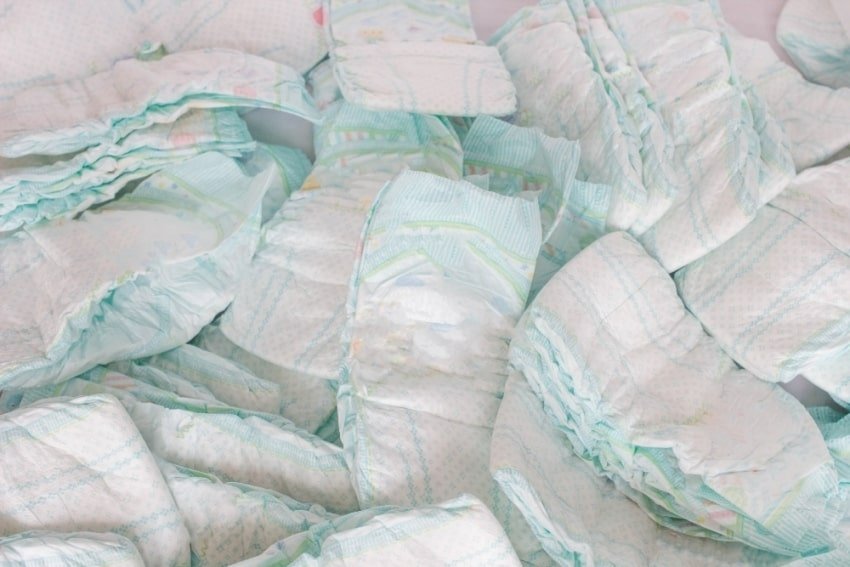
More Sizing Options
Disposable diapers have a wide variety of sizing options. You can look at the weight for each diaper and instantly see whether they will fit your little one.
Cloth diapers don’t quite work that way. These diapers come in extra small, small, medium, and large. The weight requirements for cloth diapers range for fifteen pounds or so.
Some cloth diapers are one size fits all. This can make it hard to find that perfect fit for your baby.
Disadvantages Of Using Disposable Diapers
Disposable diapers might offer a convenience that remains unrivaled by cloth diapers, but that doesn’t mean that they don’t have their own drawbacks.
Disposable Diapers Are More Expensive
For two years, you can expect to spend about $1000 on cloth diapers. Once you switch to disposable diapers, that dollar amount doubles and occasionally triples depending on the diapers that you choose to use.
Disposable Diapers Are More Likely To Cause Diaper Rash
Disposable diapers definitely smell better, but that is because they are packed with perfumes to help them smell better. Other chemicals include dyes to produce amazing colors and cool designs.
View in gallery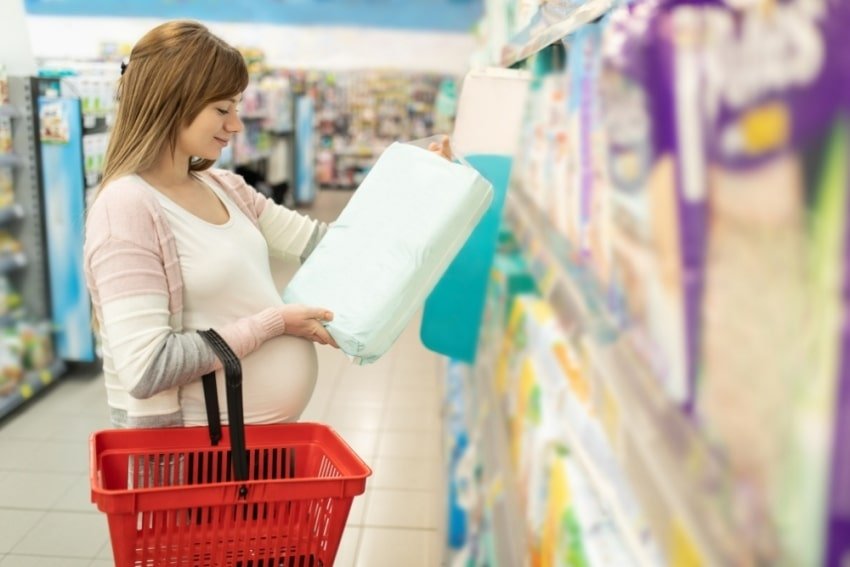
More chemicals are then added to make them more absorbent. All of those toxic chemicals are more likely to irritate your baby’s skin. This is why some babies are allergic to specific types of diapers, but other babies are not.
Disposable Diapers Wreak Havoc On The Environment
There’s nothing environmentally friendly about disposable diapers. Waste in the diapers (the poop and pee) winds up in landfills instead of being flushed down the toilet. Once there, it can pollute the water around the landfill.
The diapers themselves are also not biodegradable. This means that they have to be eliminated from landfills by standard decomposing methods.
When landfills are decomposed, this contributes to the depletion of the ozone layer due to the toxins released during the process.
Some Diapers Break Easily Or Are Not Absorbent
Unfortunately, some brands of cloth diapers are about as absorbent as cloth diapers. They may also be known for the tabs ripping off during changing. This can make disposable diapers a hassle.
Cloth Diapers Pros Vs. Cons
Cloth diapers are notorious for being better for both the environment and your wallet. While these are two of the main benefits, there are others.
There are disadvantages to using cloth diapers, too. It’s important to consider both the pros and cons of cloth diapers before deciding which one is right for your household.
Advantages Of Using Cloth Diapers
Cloth diapers aren’t only good for the environment. This choice is wonderful for your bank account and your baby. There are quite a few advantages of cloth diapers that parents will appreciate.
Cloth Diapers Are Better For The Environment
According to the EPA, 27 billion disposable diapers wind up in landfills every year. This is just in the United States alone.
The number of disposable diapers thrown away across the world on a regular basis is much higher. Someday, we’ll run out of room in those landfills that are full of disposable diapers.
Cloth diapers also use resources to be made, but they don’t wind up in landfills at the same pace that disposable diapers do.
Instead, cloth diapers are tossed out when they’re no longer usable, which is maybe a few diapers every few months. This cannot begin to compare to the number of disposable diapers in landfills.
View in gallery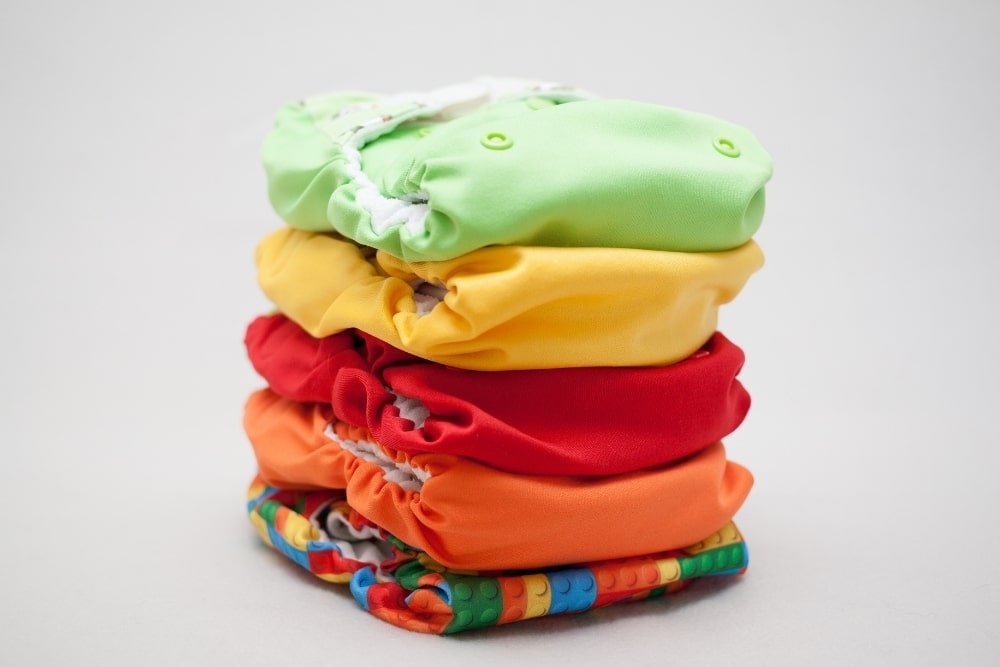
Cloth Diapers Can Be Used Over And Over
Cloth diapers can last until your little one outgrows them. You can also save them to use them for the next kid! Most people save their cloth diapers until they are done with children.
Those that opt to get rid of them can give them to another mom in need or sell them to make back some of the money that was spent.
Earlier Potty Training
Disposable diapers are designed to keep your baby’s skin as dry as possible. This is great because it means less diaper rash, and no one wants their little one sitting with pee up against their sensitive skin.
However, it also means that kids are more likely to be potty-trained later when they use disposable diapers.
When babies are in cloth diapers, they feel the wetness against their skin. Because it’s uncomfortable, they want to use the potty sooner. This also makes them a little easier to potty train.
[amalinkspro type=”showcase” asin=”B01M7WQ4ZL” apilink=”https://www.amazon.com/dp/B01M7WQ4ZL?tag=mominformedcom-20&linkCode=osi&th=1&psc=1″ new-window=”true” addtocart=”false” nofollow=”true” sc-id=”4″ imgs=”LargeImage” link-imgs=”false” specs=”Outer is A waterproof & breathable TPU.~~~The bottom three rows of snaps (the rise) are for adjusting the size to fit a small (8-15 lb), medium (12-25 lb), or large (20-35 lb) child. Simply adjust the size as your baby grows make this diaper a one size style diaper from birth to potty training~~~Package included: 6 diapers + 6 inserts+one wet bag~~~Strong absorbent material with breathability~~~Pocket diapers are easy to use, machine washable and dryable” btn-color=”#ff9900″ btn-text=”Buy on Amazon” alignment=”alignnone” hide-prime=”0″ hide-image=”0″ hide-price=”0″ hide-button=”0″ width=”750″]babygoal Reusable Cloth Diapers for Girls, Adjustable Washable Nappy 6pcs+ 6pcs Microfiber Inserts+One Wet Bag 6YDG08[/amalinkspro]
Cloth Diapers Have Fewer Chemicals
Cloth diapers are made with far fewer chemicals than disposable diapers. This means that your little one is less likely to have an allergic reaction. They are also great for babies with sensitive skin.
Disadvantages Of Using Cloth Diapers
Cloth diapers are adorable, and they work wonders for the planet, but they do come with their own list of drawbacks as well.
Everything that has a list of good things comes with a list of bad things as well. Make sure to consider the disadvantages when deciding if cloth diapers are right for you.
Cloth Diapers Are Not Disposable
While this is one of the advantages for the planet, it can be the definition of inconvenience for parents. If your little one soils their diaper while you’re out running errands, you’re stuck with the diaper until you get home.
Most parents dump the poop in the toilet at a public restroom, and some may rinse out the diaper if possible. Putting it in a scented bag can help, but sometimes there is no masking the smell.
You’ll Come Into Contact With Poop And Pee More
When you have disposable diapers, you’ll enjoy tossing every one of them in the trash. With cloth diapers, you’ll discover how non-absorbent they are by trial and error.
You will also need to scoop out the poop or carefully dump it into the toilet after each diaper change. This means you’re going to come in contact with bodily fluids a lot more than you would with disposable diapers.
View in gallery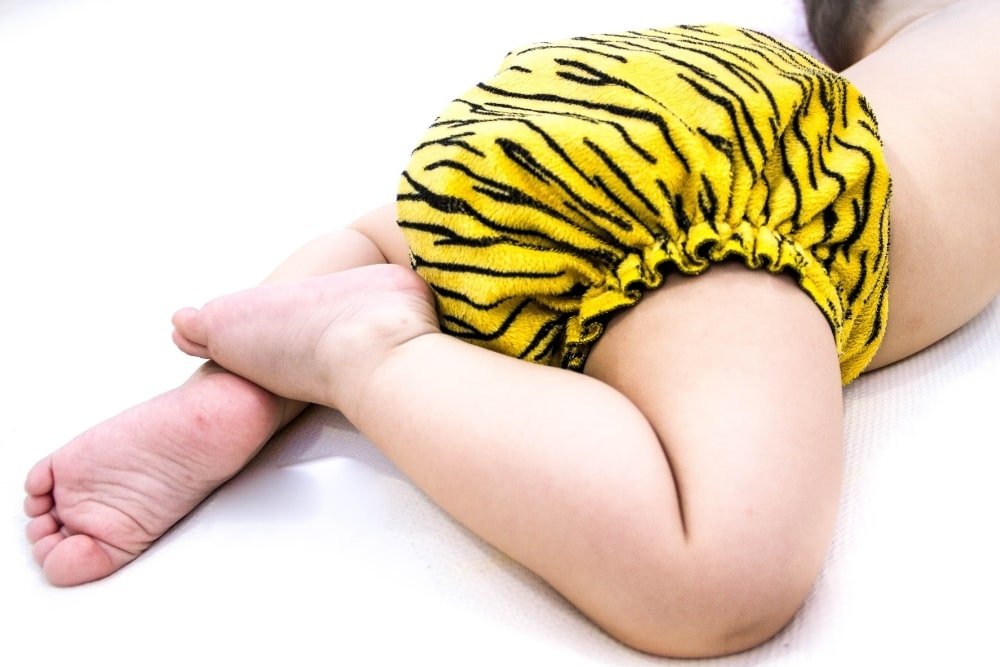
There Is A Learning Curve To Using Cloth Diapers
Before you can even begin down the path of using cloth diapers, you have to learn to use them. There are disposable liners. Sometimes, it’s going to take certain laundry soaps to get the smell out.
Don’t forget to master diaper pins! Specific liners seem to be used for certain times depending on your absorbency needs. It can be a lot to learn when you have a little one on the way.
[amalinkspro type=”showcase” asin=”0983562210″ apilink=”https://www.amazon.com/dp/0983562210?tag=mominformedcom-20&linkCode=osi&th=1&psc=1″ new-window=”true” addtocart=”false” nofollow=”true” sc-id=”4″ imgs=”LargeImage” link-imgs=”false” specs=”” btn-color=”#ff9900″ btn-text=”Buy on Amazon” alignment=”aligncenter” hide-prime=”0″ hide-image=”0″ hide-price=”0″ hide-button=”0″ width=”750″]Changing Diapers: The Hip Mom’s Guide to Modern Cloth Diapering[/amalinkspro]
Product Build-Up Can Happen, Making Them Less Absorbent
When product build-up happens with cloth diapers, they simply don’t hold as much. You’ll have to wash them repeatedly to get the product out, which is a hassle.
Examples of common products that can leave you with a less than effective cloth diaper include:
- Laundry soap if you use too much
- Laundry additives (like fabric softener)
- Diaper rash cream
It’ll take some practice to determine how much laundry soap you will need to use. You’ll also need to purchase liners for when you need to use diaper rash cream so you don’t ruin the diaper.
Washing Cloth Diapers Can Be A Hassle
While cloth diapers are great for both the environment and your wallet, you’re going to have to put in a little extra work. There is no taking off a diaper and tossing it in the trash.
Instead, you’ll find yourself washing cloth diapers over. And over. And over. If you buy more diapers to cut back on laundry, you don’t save as much money.
Cloth Diapers Are Less Absorbent, So They Need To Be Changed More
Cloth diapers don’t have the same magic formula that is specifically designed to wick away moisture that disposable diapers do.
This translates into you having to change diapers more often. It can be almost double the diaper changes at times, especially in younger infants.
Using Both Cloth And Disposable Diapers Is An Ideal Solution
Most parents find that they can enjoy the benefits of both cloth and disposable diapers when they use both of them. You can use cloth diapers at home to save money, prevent diaper rash, and enjoy the other benefits that come with cloth diapers.
When leaving home, you can opt for disposable diapers. This eliminates the inconvenience of having to carry around dirty (and smelly) cloth diapers, frequent changes, and other downfalls that go hand in hand with cloth diapers.
View in gallery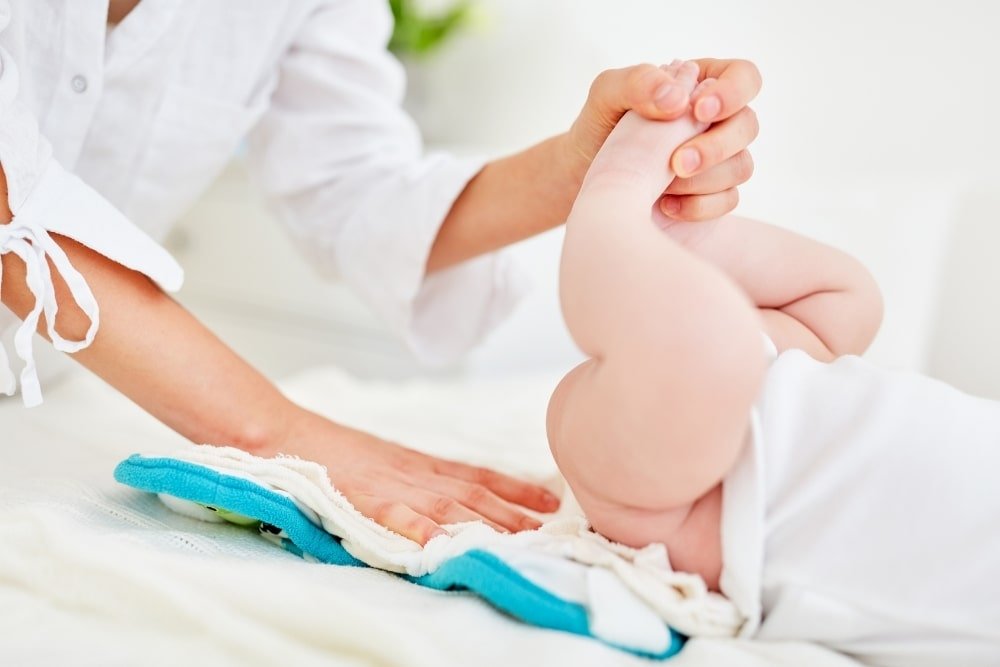
Don’t Forget To Consider The Pros Vs. Cons Of Disposable And Cloth Wipes
Most put a significant amount of thought into diapers, and it’s important to put the same careful consideration into the type of wipes you use. They have similar pros vs. cons when compared to different types of diapers.
Pros of using cloth wipes
- Budget-friendly
- Fewer chemicals
- Fewer skin sensitivities
- Less harmful to the environment
Cons of using disposable wipes
- Extra laundry takes more time
- You don’t throw them away when away from home
Pros of using disposable wipes
- Convenient
- Affordable
- You never run out of wipes
Cons of using disposable wipes
- More expensive
- Harmful to the environment
- Can stop up toilets if accidentally flushed
- Can cause allergic reactions in babies due to chemicals used
Most people opt for a nice combination of both disposable wipes and cloth wipes. Cloth wipes are less hassle for pee diapers and at-home use, yet disposable diapers are preferred by daycares and convenient when you’re on the run.
This helps you save a little bit of money, pitch in on helping the environment, and doesn’t stress you out.
In Conclusion
Both cloth and disposable diapers come with their own list of pros and cons. Most people that want to save money or be more environmentally friendly opt for cloth diapers.
Those that need more convenience appreciate the benefits of disposable diapers. Consider both of them to decide what is right for your household.






